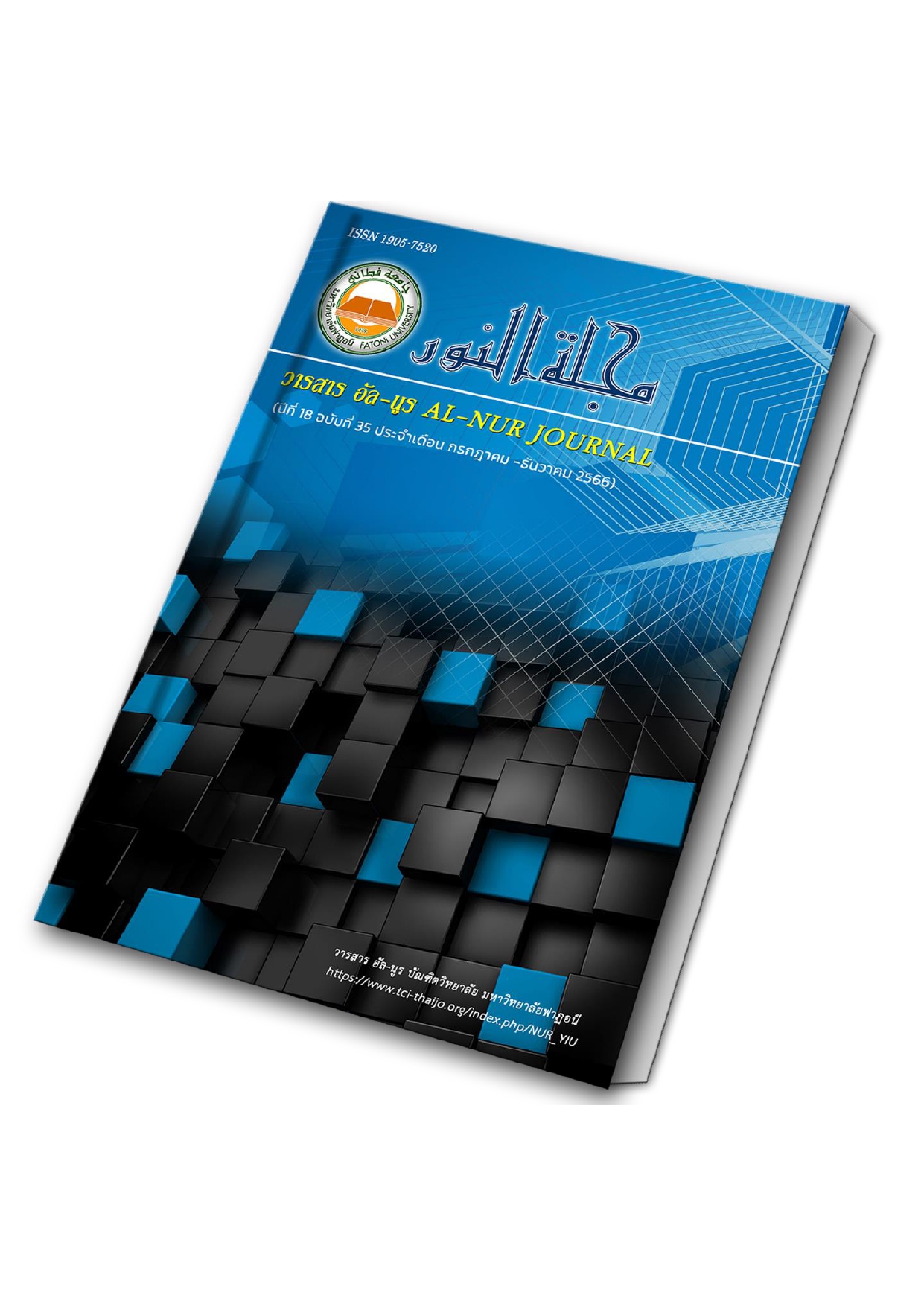Developing a platform-based online instructional management for enhancing competence in young entrepreneurs
Keywords:
Little Entrepreneurship, Phenomenon-Based Learning, Online PlatformAbstract
The objectives of this study were to 1) study the need for developing learning management through online platforms, 2) develop learning management through online learning platforms, and 3) evaluate the competencies of young entrepreneurs in learning through online platforms. The target was a group of 63 junior high school students in the academic year 2021, Ban Kato school, Panare Subdistrict, Panare District, Pattani Province. The findings were as follows: 1) the school had a need and readiness for developing learning activities to improve the students' entrepreneurial competencies, which align with the context of the students, the community need, and the school's focus on competency-based curriculum; 2) the efficiency value (E1/E2) of the online young entrepreneurial course was 80.85/82.62, and the pre-and post-learning achievements were significantly different at 0.05. The content of the course covered five learning management plans- 1) Self-awareness,
2) Market analysis, 3) Digital marketing tools, 4) Marketing operations, and 5) Marketing measurement and evaluation, to enhance the students' entrepreneurial competencies through online platforms according to the phenomenon-based learning management approach. The overall competency of the young entrepreneurs was at the highest level, with an average of 4.72. The performance in terms of competitiveness was at the highest mean - 4.76, followed by other entrepreneurial skills - independence in management, innovation creation, proactive working, and taking risks with mean values of 4.73, 4.71, 4.69, and 4.68, respectively.
References
กระทรวงศึกษาธิการ. (2560). แนวทางการดำเนินงานโครงการสถานศึกษาน้อมนาศาสตร์พระราชา
สู่การพัฒนาอย่างยั่งยืน กระทรวงศึกษาธิการ. กรุงเทพฯ: สำนักส่งเสริมกิจการศึกษา
ชนัญญา สุขสมวัฒน์, สุวิมล ว่องวาณิช, ชยุตม์ ภิรมย์สมบัติ (2563)”.แนวทางการจัดการเรียนการสอนเพื่อ
ส่งเสริมความเป็นผู้ประกอบการของนักเรียน : คราวด์ซอร์สซิ่ง.
ปรีชา ศรีสุพัฒน์.(2565).การพัฒนาสมรรถนะผู้เรียน ระดับการศึกษาขั้นพื้นฐาน:ทักษะอาชีพและการเป็น
ผู้ประกอบการ.มจร เลย ปริทัศน์, 3(1), 114.
โยธิน ทองเนื้อแข็ง, ชนิศร์ ชูเลื่อน, & รัชชเมธ จันทนวล. (2021). การพัฒนาการศึกษาสู่ศตวรรษ
ที่ 21. JOURNAL MAHA CHULA TANI MAHACHULALONGKORNRAJAVIDYALAYA UNIVERSITY, 3(5), 53-63.
สำนักงานคณะกรรมการกฤษฎีกา. (2554). พระราชบัญญัติการศึกษาแห่งชาติ พ.ศ. 2542และที่ แก้ไขเพิ่มเติม
(ฉบับที่ 2) พ.ศ. 2545และ (ฉบับที่ 3) พ.ศ. 2553. กรุงเทพมหานคร: ส านักงานคณะกรรมการกฤษฎีกา.
สำนักงานเลขาธิการสภาผู้แทนราษฎร. (2562). ความมุ่งหมายและคําอธิบายประกอบรายมาตรา
ของรัฐธรรมนูญแห่งราชอาณาจักรไทย พุทธศักราช 2560. กรุงเทพฯ: สำนักงานเลขาธิการ
สภาผู้แทนราษฎร.
สํานักงานเลขาธิการสภาการศึกษา. (2557). รายงานการวิจัยแนวทางการพัฒนาการศึกษาไทยกับ การเตรียม
ความพรอมศตวรรษที่ 21. กรุงเทพฯ : สํานักงานเลขาธิการสภาการศึกษา
สุทิศา เสาวกุล, เมธินี วงศ์วานิช รัมภกาภรณ์ และ พนิต เข็มทอง. (2562). การพัฒนากิจกรรมความเป็น
ผู้ประกอบการในรายวิชางานอาชีพ โดยใช้วิธีการจัดการเรียนรู้แบบโครงงาน สําหรับนักเรียนชั้น
มัธยมศึกษาปีที่ 5 โรงเรียนวัดสุทธิวราราม กรุงเทพมหานคร. วารสารศึกษาศาสตร์ปริทัศน์, 34(3),
-78.
วรพจน์วงศ์ กิจรุ่งเรืองและอธิป จิตฤกษ.์ (2554).ทักษะแห่งอนาคตใหม่ การศึกษาเพื่อ ศตวรรษที่ 21 .
กรุงเทพฯ: open word.
วิจารณ์ พานิช. (2555). วิถีสร้างการเรียนร้เพื่อศิษย์ในศตวรรษที่ ู 21.กรุงเทพฯ : มูลนิธิสดศรี- สฤษดิ์วงศ์.
อรพรรณ บุตรกตัญญู. (2561). การเรียนรู้โดยใช้ปรากฏการณ์เป็นฐานเพื่อการสร้างมุมมองแบบองค์ รวมและ
การเข้าถึงโลกแห่งความจริงของผู้เรียน. วารสารครุศาสตร์ จุฬาลงกรณ์ มหาวิทยาลัย, 46(2), 348-
Bellanca & R. Brandt. (2011). 21stCentury skills: Rethinking how students learn(pp.210-236).
Victoria : Hawker Brownlow Education.
Symeonidis, V. & Schwarz, J. F. (2016). Phenomenon-Based Teaching and Learning through
the Pedagogical Lenses of Phenomenology: The Recent Curriculum Reform in Finland. Forum Oświatowe. 28(2), 31–47.
World Economic Forum. (2011). The global competitiveness report 2016 - 2017. Available at
http://www.weforum.org. (accessed 25 July 2015)
Downloads
Published
Issue
Section
License
Copyright (c) 2023 Abdul-Asit Hayeekhade ; Jaruwat Songmuang

This work is licensed under a Creative Commons Attribution-NonCommercial-NoDerivatives 4.0 International License.
Proposed Creative Commons Copyright Notices


